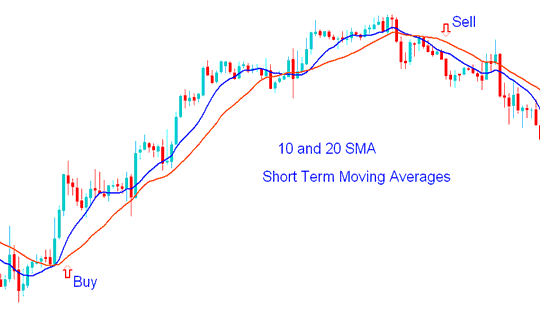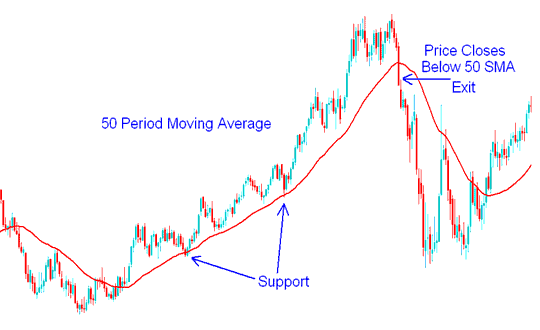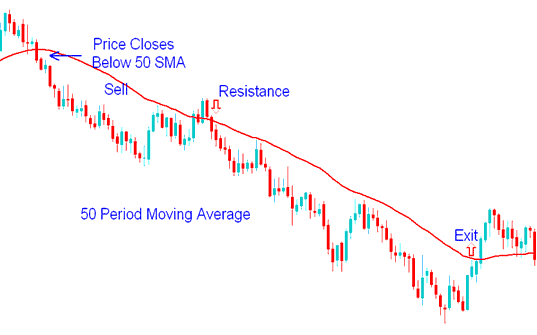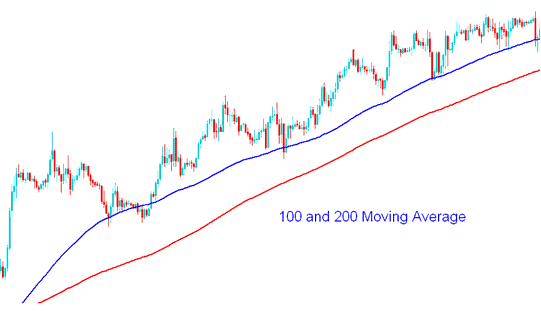Short Term Moving Averages Oil Strategies
Short term strategy will use short price moving average periods such as the 10 and 20 moving average periods.
In the example shown below we use 10 and 20 SMA to generate Oil signals: the signals generated are able to identify the trend as early as possible.

Short-term with Moving Averages - How to Trade Oil with Moving Averages Example
Using Moving Averages
One of the most widely used methods of technical analysis used to analyze chart trends in scalping and intraday trading is the use of moving averages.
The idea of this moving average indicator is to simply enhance technical analysis before taking a signal to enter the crude trading market. Planning and setting oil goals in the short term according to moving average indicator helps a scalper trader to identify trends in the market and thus open a order accordingly.
Most of the signals can be generated using a specific price period for the Moving Average Indicator. The oil Moving averages price period used will determine whether the trader will trade in the short term or long term. In addition to this, if the price action is above or below this moving average indicator it determines the trend of the market for the day.
If a large part of the crude trading market price is considered to be below the Moving average indicator, then bias trend for the day is downward trend. Most traders the use the MA as support or resistance indicator to determine where to open trade positions, if price touches the MA in direction of the market trend a trade is then opened.
The oil moving averages are drawn and the intersection point with the price can be used to determine the appropriate entry and exit times when trading in the crude trading market. Since there is always oscillation in the market trends and the market will repeat this process of oscillating and bouncing off the MA, this can be used to generate buy or sell crude trading signals.
Simple moving averages are calculated and their technical analysis is based on the observation of the price within a particular period of time using sufficient data to calculate these moving averages. Their interpretation has provided many oil scalpers and intraday traders with lots of tips on how and when to open scalping trades and oil intraday trades.
Medium-Term Strategy
Medium term moving average strategy will use the 50 period MA.
The 50 period MA acts as support or resistance level for the price.
In an upward trend the 50 period MA will act as a support, price should always bounce back up after touching the MA. If the market closes below the indicator then this will be an exit signal.

50 Moving Average Period Support - Oil Strategy Method Example
In a down trend the 50 period MA will act as a resistance, price should always go down after touching the moving average. If the market closes above the indicator then this is an exit signal.

50 Moving Average Period Resistance - Oil Strategies Example
50 Day Moving Average Technical Analysis
As the trend moves up, there is a key line you want to watch - this is the 50 day moving average. If the market stays above this 50 day moving average, that is a good signal. If the market drops below the 50 day moving average in heavy volume, then watch out, because there could be trend reversal signal ahead.
A 50 day MA indicator takes 10 weeks of market data, and then plots the average. Moving line is recalculated everyday. This will show the trend - it can be up, down, or sideways.
You normally should only buy when prices are above their 50 day MA. This tells you the current market direction is trending upward. You always want to trade with the trend, and not against it. Many traders only open orders in direction of the trend.
Crude prices normally will find support over and over again at this 50 day moving average. Big investing institutions watch this level very closely. When these big volume entities spot a trend moving down to its 50 day line, they see it as an opportunity, to add to their trade position, or start a new trade position at a reasonable level.
What does it mean if your oil moves downward and slices through its 50 day line. If it happens on heavy volume, it is a strong signal to sell. This means big institutions are selling their share, and that can cause a dramatic drop, even if fundamentals still look solid. Now, if your oil instrument drops slightly below the 50 day line on light volume, watch how it acts in the following days, and take appropriate action if necessary.
Long-Term Strategy
Long term strategy will use long period such as the 100 and 200 MAs which act as long term support and resistance levels for the price. Since many traders use these 100 and 200 oil moving averages, the price will often react to these support and resistance areas.

100 and 200 MAs - How to Trade Oil Using MA Oil Methods
In Oil, traders can use both fundamental analysis and technical analysis to help determine whether a oil is a good buy or sell.
In analysis technique traders looking to gauge supply and demand for a oil instrument use the 200 day moving average to examine data in different ways.
Traders are most familiar with the basic analysis of the 200 day MA which is used to draw the long term support or resistance level. If crude market price is above 200 day MA then the trend is bullish, and if it is below it then trend is bearish.
One of the ways to measure supply and demand in oil is to calculate the average closing price over the last 200 sessions. This oil trading moving average accounts for each day going back in time and shows you how this 200 day average has moved.
The reason why the average 200 day MA in particular is so popular in analysis is because historically has been used and it produces good results for trading in the crude trading market. A popular timing strategy is used to buy when the market is above its moving average of 200 days and sell when it goes below it.
With this moving average indicator, crude traders can benefit from being notified when a oil instrument rises above, or falls below its 200 day Moving Average and then traders can then use their technical analysis to help determine if the signal is an opportunity to go long or short.




